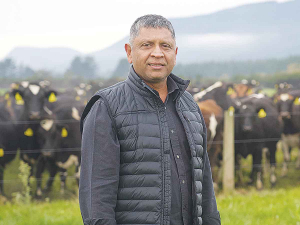Indian FTA 'opens doors for dairy'
A New Zealand dairy industry leader believes the free trade deal announced with India delivers wins for the sector.
 Prem Maan, Southern Pastures’ executive chairman says their farms have a massive programme to sequester carbon and reduce greenhouse gas emissions.
Prem Maan, Southern Pastures’ executive chairman says their farms have a massive programme to sequester carbon and reduce greenhouse gas emissions.
Corporate dairy farmer Southern Pastures has been judged to be a responsible investment leader for the seventh year running.
The company, which owns 19 dairy farms in Waikato and Canterbury and is the owner of premium dairy brand Lewis Road Creamery and wholesale business NZ Grass Fed Products LP, says it remains the only organisation from New Zealand's agriculture and food sectors to ever be included in the annual benchmark report released by the Responsible Investment Association Australasia (RIAA).
"So often the pastoral industry is judged by outputs such as emissions, but we're not nearly as rigorously measured or assessed for the positive services that some of us provide," says Prem Maan, Southern Pastures' executive chairman.
"On our farms, we have a massive programme of work underway to sequester carbon and reduce our greenhouse gas emissions and foster biodiversity through, for example, good soil management, native plantings, and animal feed.
"We also act at executive level as strong stewards for more sustainable and resilient assets and markets. The RIAA benchmark is one way these positive efforts are independently recognised," says Maan.
RIAA represents investors with assets under management of over US$29 trillion, including NZ Managers who represent $328 billion.
Southern Pastures produces milk under its independently-audited 10 Star Certified Values standard, which covers stringent grass-fed, free-range, climate-change mitigation, human welfare, animal welfare, and sustainability requirements.
It doesn't feed cows imported palm kernel expeller (PKE), claiming its production contributes to loss of rainforest and biodiversity.
It also refuses to trade in carbon credits or offsets to achieve its zero carbon ambitions, but is committed to long-term farming techniques such as low tillage and deep-rooted plants that capture and store carbon from the atmosphere. It's also trialling and measuring numerous other initiatives such as biochar, dung beetles and prebiotics, as well as retiring land to native plantings.
"Soil can hold up to three times the amount of carbon than the atmosphere and all plant combined," says Maan.
"We think a positive approach to preserving carbon in our soil is potentially part of the answer to mitigating climate change.
"It's a shame that carbon sequestraction through on-farm soil management, native plantings and biodiversity is not prioritised in New Zealand over monoculture exotic trees."
The World Wide Sires National All Day Breeds Best Youth Camp Best All Rounder plaudit has become family affair, with 2026 Paramount Cup winner Holly Williams following in her sister Zara's footsteps.
DairyNZ is giving New Zealand farmers a unique opportunity to gain hands-on governance and leadership experience within the dairy sector.
Herd improvement company LIC has posted a 5.2% lift in half-year revenue, thanks to increasing demand for genetics.
According to the latest Fresh Produce Trend Report from United Fresh, 2026 will be a year where fruit and vegetables are shaped by cost pressures, rapid digital adoption, and a renewed focus on wellbeing at home.
The Roar is a highlight of the game hunting calendar in New Zealand, with thousands of hunters set to head for the hills to hunt male stags during March and April.
OPINION: The past few weeks have been tough on farms across the North Island: floods and storms have caused damage and disruption to families and businesses.